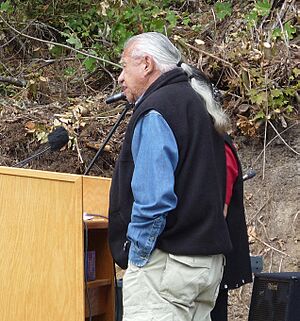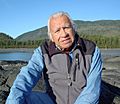Billy Frank, Jr. facts for kids
Billy Frank, Jr. (born March 9, 1931 – died May 5, 2014) was an important Native American leader. He worked hard to protect the environment and fought for the rights of his people. He is famous for his efforts to protect fishing rights on the Nisqually River in Washington.
Frank was very active during the 1960s and 1970s. He helped make sure that natural resources in Washington state were protected for everyone. He was born in Nisqually, Washington. Billy Frank, Jr. passed away on May 5, 2014, at the age of 83.
Contents
Who Was Billy Frank, Jr.?
Billy Frank, Jr. was a member of the Nisqually Tribe. From a young age, he learned the importance of the land and rivers. His family had fished the Nisqually River for many generations. Fishing was not just a way to get food; it was a central part of their culture and way of life.
He grew up seeing how fishing rights were being taken away from Native American tribes. This made him want to stand up for his people. He believed that treaties signed long ago should be honored. These treaties promised Native Americans the right to fish in their traditional places.
Fighting for Fishing Rights
Billy Frank, Jr. became a leader in what was called the "Fish Wars." This was a time when Native Americans in Washington state were fighting for their treaty rights to fish. State laws often made it hard for them to fish, even though treaties said they could.
Frank and other activists used peaceful protests to show their concerns. They would fish in their usual spots, even if it meant being arrested. Billy Frank, Jr. was arrested many times for fishing. But he never gave up. He believed that standing up for their rights was the only way to make a change.
Protecting Nature's Resources
Billy Frank, Jr.'s fight was not just about fishing. It was also about protecting the rivers and the fish themselves. He knew that if the rivers were polluted or damaged, there would be no fish for anyone. He worked to protect the natural environment that his tribe depended on.
He helped people understand that protecting the environment benefits everyone. He worked with different groups, including government officials and environmental organizations. His goal was to make sure that rivers were clean and healthy. He wanted future generations to be able to fish and enjoy nature.
His Legacy and Impact
Billy Frank, Jr.'s efforts led to important changes. In 1974, a major court case called the Boldt Decision confirmed the treaty rights of Native American tribes to half of the fish harvest. This was a huge victory for Billy Frank, Jr. and many others.
After this, he continued to work for environmental protection and tribal rights. He helped create new ways for tribes and the state to work together. He showed that different groups could cooperate to protect natural resources. His work helped create a better future for both people and the environment.
Billy Frank, Jr. received many awards for his work. He was given the Presidential Medal of Freedom, one of the highest honors in the United States. He is remembered as a hero who fought for justice, treaty rights, and a healthy planet.
Images for kids
 | Janet Taylor Pickett |
 | Synthia Saint James |
 | Howardena Pindell |
 | Faith Ringgold |



